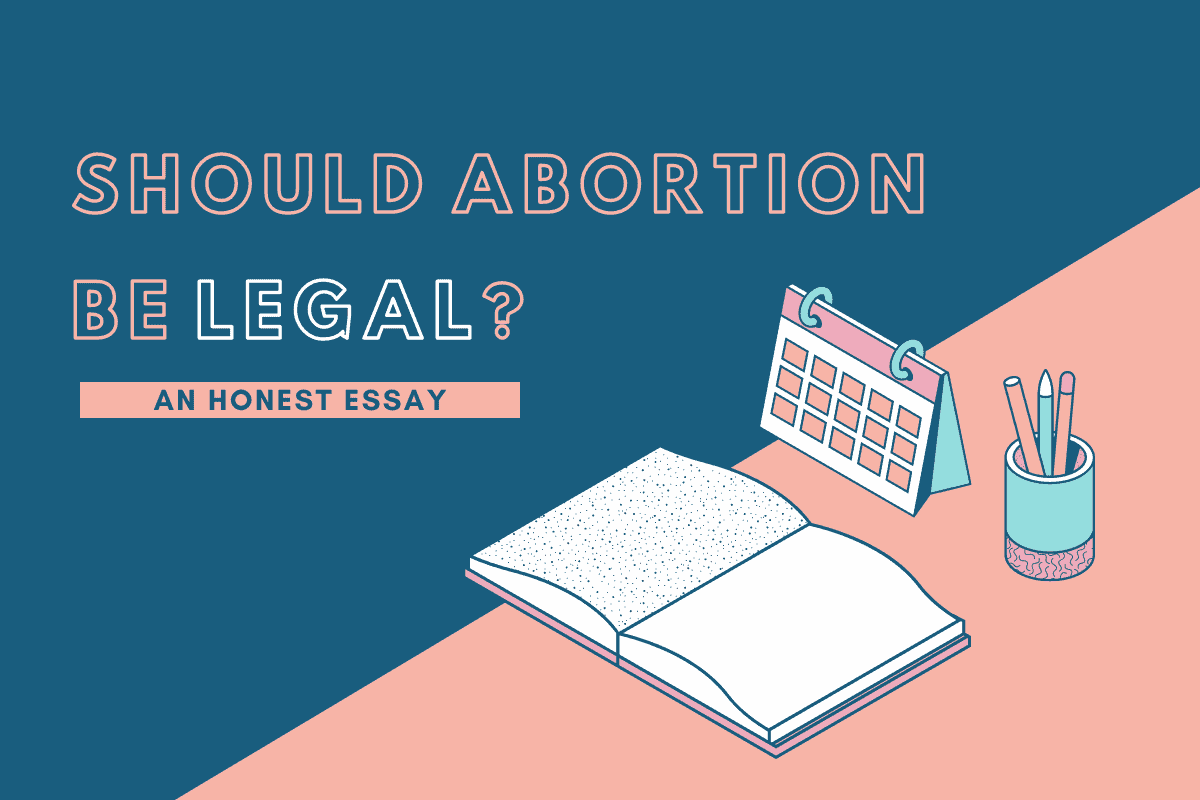
SHOULD ABORTION BE LEGAL?
Is abortion a simple women’s issue? Not quite. An estimated 63 million lives have been lost to U.S. abortions since Roe v. Wade. Considering the scope of abortion's impact on both men and women, it’s safe to assume that abortion is more prominently a civil rights issue.
Heartbeat Bills are being introduced in court. The right to privacy and bodily autonomy is being reexamined. Now is a great time to have an honest conversation about abortion. Should abortion be legal? Is it really a constitutional right? And do we even have the right to discuss it?
Abortion: Legal or Illegal and Who Gets a Say?
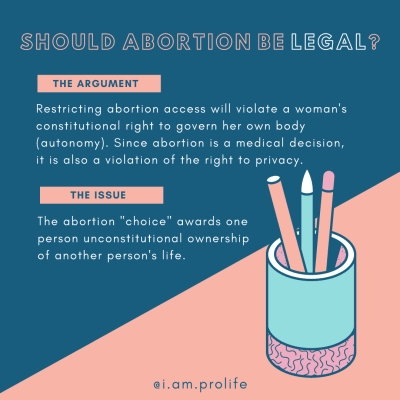
Is abortion strictly a women’s issue? Not quite. Abortion impacts more than those making the abortion decision.
Since the infamous ruling of Roe v. Wade in 1973, over 63 million lives have been lost. Lives lost were those of men and women, African American, Caucasian and other ethnicities. Some were conceived at less than ideal times while others were aborted for being created different, having special needs or disabilities.
Knowing this, limiting abortion to being a “women’s issue” drastically misrepresents the problem. Moreover, it oppresses the voice of a weaker and silent minority: preborn children.
Those participating in the abortion debate take one of two sides: pro-life or pro-choice. Often, members of the latter group will argue that only the abortion-minded woman should have the right to speak to the abortion issue. At first glance, it seems like a valid point. After all, isn’t it a decision that impacts her and her body the most?
Who can talk about abortion?
Lyric Gillett, a pro-lifer who advocates for the voice of abortion survivors, describes the faulty thinking behind the idea that only post-abortive or abortion-minded women can speak authoritatively about abortion. Gillett points out that if we argue that only those impacted most by abortion have a say in the issue, then the strongest voice should actually fall to abortion survivors.
Knowing the scope of abortion’s impact on men, women, children, the religious and non-religious alike, we can take courage. We all have the right to discuss if abortion should be legal, no matter who we are.
Should the Abortion "Choice" Be Illegal?
The prominent stance on why abortion should be legal revolves around bodily autonomy and the right to privacy. For U.S. citizens, the independence of an individual is considered something sacred.
Take, for example, the famous introduction of one of our nation’s most precious documents:
"We hold these truths to be self-evident, that all men are created equal, that they are endowed by their Creator with certain unalienable Rights, that among these are Life, Liberty and the pursuit of Happiness."
The Declaration of Independence
Liberties we consider “unalienable” are reflected in the U.S. Constitution as a right. And you’ve probably heard the claim that “abortion is a woman’s constitutional right.”
It’s a convenient claim, and it sounds good when repeated on your local news network. But let’s unpack it.
Defining Constitutional Rights
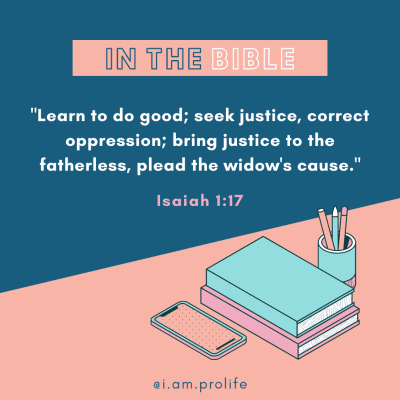
Cornell University defines constitutional rights as:
"the protections and liberties guaranteed to the people by the U.S. Constitution. Many of these rights are outlined in the Bill of Rights, such as the right to free speech and the right to a speedy and public trial. Even though these rights are expressly stated, their proper interpretation and scope has been the subject of many Supreme Court decisions. Additionally, not all rights protected by the U.S. Constitution are explicitly stated. Some are implied or unenumerated, like the right to privacy."
When a person claims that abortion should be legal because it is a constitutional right, they usually mean that restricting a woman’s “choice” violates her right to privacy, infringing on her right to make decisions about her own wellbeing.
Abortion: A Constitutional Right?
But, by Cornell’s definition, a constitutional right could be any right, listed or implied, by the constitution’s intent to preserve fundamental human rights.
As you can imagine, with such a generic definition, it’s hard to draw a hard line between convenient claims and Constitutional rights. Of course, when it comes to discussing human rights, it’s helpful to look at similar issues in history. Knowing how our nation responded to these closely-related cases is vital in understanding how the United States classifies a claim as a constitutional right.
Similar Issues in History
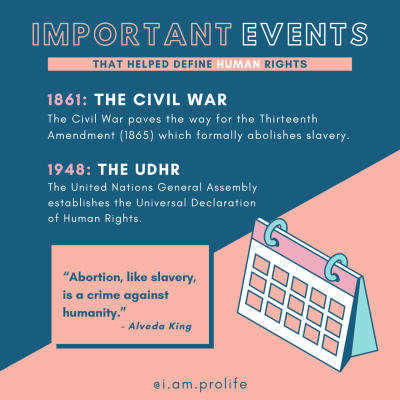
There are many cases in which the U.S. Government has placed stipulations on things like privacy and autonomy. For example, consider The Civil War (1861). This war marked the beginning of the United States’ brave plunge into defining personal rights.
The issue of slavery, one human being awarded ownership over another, was one of the primary issues fought over during this war.
As mentioned in our previous article on bodily autonomy:
"The owner of an 1800's plantation could have easily claimed that his purchasing an imported slave made that slave his property. He could have further argued, as many surely did, that the government's involvement in what took place on his plantation was an invasion of privacy. The tipping point of this argument is that human life is not property to anyone but the sole owner of that life. That is the heart behind the Declaration of Independence's statement that 'all men are created equal.' No one living being, despite his position of physical or political power, had the right to dominate another. By this founding principal, slavery was abolished and women's suffrage was achieved."
Reproductive Rights and Contraception
In years preceding events like the abolition of slavery and Women’s Sufferage, several court cases would attempt to define further the boundaries of the right to privacy and personal autonomy. For example, in Griswold v. Connecticut (1965), the Supreme Court ruled that the U.S. Constitution protects the right of privacy for married couples to use contraception without government restrictions.
Thankfully, abortion isn’t considered contraception. Despite some arguing that it should be considered as such, abortion is much more than preventing two pink lines of a pregnancy test. Like slavery, the abortion “choice” awards one person unconstitutional ownership of another person’s life. Furthermore, abortion does not prevent pregnancy, as contraception does. Instead, it ends it along with the life encapsulated within that pregnancy.
Restrictions On Medical Procedures
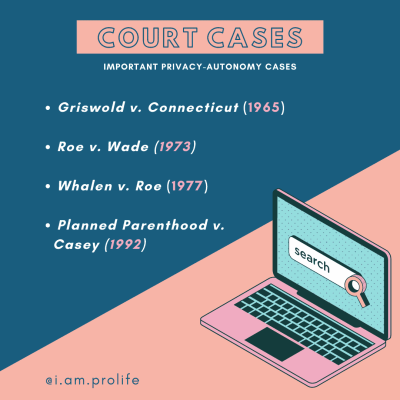
nother common argument for keeping abortion legal is that health-related decisions should be between a patient and their doctor (again, the right to privacy).
However, placing restrictions on medical procedures for the wellbeing of patients involved isn’t a new practice. And any qualified OB-GYN will tell you that mother and preborn child are treated as two patients (not just one).
WATCH: My Patients Haven’t Been Born Yet – Dr. Bill Lile
A few court cases in which the government regulated interactions between patients and doctors include:
- Whalen v. Roe (1977) – Required doctors to write and submit patient information forms for prescriptions of potentially harmful medication.
- Planned Parenthood v. Casey (1992) – Affirmed Roe v. Wade but allowed the Pennsylvania legislature to amend their abortion law. They added several provisions. These provisions included a 24-hour waiting before the abortion procedure. Additionally, minors need the consent of one parent (or judicial bypass) before receiving an abortion.
So, is there ground for placing protective measures on the abortion procedure? Absolutely!
Reasons for restricting abortion access come from understanding the potential harm abortion can cause. For instance, consider the testimonies of former abortion workers. Many of these professionals attest to the abortion industry’s harmful marketing of abortions. Furthermore, OB-GYNs who provide life-saving services like abortion pill reversal (APR) are discriminated against by abortion providers and mainstream media. Those favoring abortion falsely claim that services like APR are a hoax or “experimental science,” despite the procedure’s success rate.
Former Abortion Workers
Abortion Pill Harm & Reversal
But what about "Stare decisis"?
If you’ve been following the recent supreme court case of Dobbs v. JWHO, you’ve probably heard the term stare decisis. This term is Latin for “to stand by things decided.”
The idea of stare decisis is that the Supreme Court should not contradict itself by ruling future cases in the same way it ruled similar cases. It is argued that overturning the rulings of cases like Roe v. Wade or Bolton v. Doe would violate this principle.
So, would abolishing abortion violate stare decisis?
Not necessarily.
Admitting When We're Wrong
Roe v. Wade was not the first Supreme Court case to favor an inhumane cause. Likewise, it would not be the first Supreme Court case to be overturned.
For example, in 1896, the Supreme Court case, Plessy v. Ferguson, upheld the cruel practice of racial segregation in the U.S. Thankfully, the Supreme Court later corrected the ruling with cases like Brown v. Board of Education.
Overturning a past decision, especially in light of scientific evidence, is not a contradiction but a reflection of moral growth and maturity. Additionally, the Constitution outlines the possibility that unjust laws will exist and that it’s the right of the people to advocate for change in response to those laws. Knowing this, it could be argued that if stare decisis were exercised too rigidly, it could become a constitutional violation in itself.
Just because a case has been wrongly decided for many years is no reason to keep upholding bad law. After all, schools were segregated for 58 years until the court reversed itself in Brown v. Board of Education in 1954.
Jim Daly, "The Beginning of the End of Abortion"
Do Women "Need" Abortions?
Although there are reasons to restrict abortion access, questions still stand.
“Yes, abortions are harmful,” you may say, “but that doesn’t mean we should completely abolish it, right? Besides, what if a woman needs an abortion?”
These are great questions. And it wouldn’t make sense to seek the abolition of abortion without answering them. First, let’s look at the reasons why women may seek out an abortion.
Reasons for Abortion
As summarized by BMC Women’s Health, most women get abortions for these reasons:
- Financial Reasons (40%)
- Timing (36%)
- Partner-related reasons (31%)
- A need for focus on the children they already have (29%)
Does abortion provide a solution to these problems?
Many believe reducing the headcount of a family will naturally reduce any financial strain they may be experiencing. However, research has found that the cost of a family is not necessarily correlated with the headcount of the family. Moreover, studies show that most women pay for their abortions out of pocket. Abortions cost anywhere between $600 to $1600. Knowing this, it’s painfully clear that abortion is not a feasible answer for most women who consider them.
To make matters worse, many women report physical, mental and emotional costs for having have an abortion. For example, celebrities like Sharon Osbourne and Alyssa Milano have made comments on the impact of abortion in their lives. As revealed by their stories, any benefits they claim to have received from abortion are accompanied by painful or traumatic experiences.
Should Abortion Be Legal for Rare Cases?
“But what about the women who really need an abortion?” you ask. “And what about cases of ectopic pregnancies or where the woman’s life is in danger?
I like the way you think! There’s no shame in questioning pro-life claims out of compassion for women in difficult circumstances. Surprisingly, it’s by refusing to settle for abortion as an answer that leads us to real solutions for women in need.
Many medical professionals can attest to abortion rarely or never being medically necessary for women. Recently, doctors have recognized that challenging pregnancies are too quickly met with the offer to abort. This is specifically the case when it comes to babies diagnosed with things like Down syndrome and Cerebral palsy.
Below, medical professionals expound upon the false claim that abortion is healthcare. Also, from adverse diagnosis to ectopic pregnancy, those with first-hand experience debunk the claim that abortion is medically necessary.
WARNING: The following content contains open and honest conversations. For this reason, they may contain triggering content for post-abortive women. Please, view and share with caution. (For information or healing support, call 1-800-AFAMILY).
Videos
- Live Action: Is Abortion Ever Medically Necessary?
- Live Action: The Pro-Life Reply to “Abortion Can Be Medically Necessary”
- Dr. Bill Lile | The Preborn as Patients
- Sometimes the Choice is Hard
Articles
- Abortion is Not a ‘Viable’ Option
- Are Late-Term Abortions Still a Thing?
- Live Action: Abortion is Never Medically Necessary, and is Not Healthcare
Should Abortion Be Illegal?
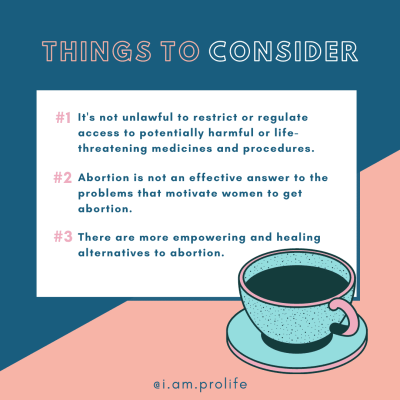
Now knowing the facts, it’s easier to answer if abortion should be legal. The reasons why abortion shouldn’t be legal can be summarized into three points.
- Protecting Patients – To restrict or regulate access to potentially harmful or life-threatening medicines or procedures is a good thing. The abortion industry openly promotes the idea that abortion should be widely accessible. However, many OB-GYNs have advised against this out of concern for their patients.
- Promoting Real Solutions to Real Problems – Abortion is not an effective answer to the reasons why women get them. When abortion is offered and promoted as such, women in challenging life circumstances are denied the best options for personal empowerment.
- Providing Quality Healthcare – Allowing an archaic procedure like abortion to be considered modern healthcare is a disservice to women and children who deserve better and actualhealthcare.
Further Research, Blogs, Essays and More
When answering the question of should abortion be legal, we encourage you to build your own thoughts on the issue. Explore further research, blogs, essays and more. Ask challenging questions and find compassionate answers.
Here are some great resources for building a deeper understanding of the abortion issue and the complex politics surrounding it:
Websites
- Doc’s Thoughts (blog) – Dr. Bill Lile is board certified in obstetrics and gynecology. Additionally, he specializes in Abortion Pill Reversal and patient rights. His blog, Doc’s Thoughts, discusses these issues and more.
- AAPLOG – If you’d like to find a pro-life physician to interview concerning pro-life issues, this is the site for you. The American Association of Pro-Life Obstetricians and Gynecologists has a function for finding a pro-life OB/GYN in your area. Also, this site is a great resources for helping any friends facing an abortion decision.
- Charlotte Lozier Institute – The Charlotte Lozier Institute specializes in research concerning abortion, stem cells, fetal development and more. And they strive to “identify policies and practices that will protect life and serve both women’s health and family wellbeing.”
- Guttmacher Institute – Guttmacher Institute is a pro-abortion source. However, they offer extensive reporting on the abortion industry.
Books
- The Case for Life – Scott Klusendorf is a well-known pro-life advocate. Undoubtebly, his book, The Case for Life, is a valuable resource when learning how to best express pro-life values.
- Black and Pro-Life in America: The Incarceration and Exoneration of Walter B. Hoye II – Shockingly, in 2009, police arrested Walter B. Hoye II for standing outside an abortion clinic. His book gives great insight into the unconstitutional mindsets that protect abortion. For example, he gives the account of how a “bubble law” led up to his unconstitutional arrest.
- Unplanned – Abby Johnson was pro-choice director of a Planned Parenthood. Her own heartbreaking experiences within the abortion and the abortion industry drove her to leave it all behind.
- More books about abortion and other pro-life issues can be found in the Focus on the Family Bookstore.
Videos
- “Don’t Take the Pill” | Dr. Bill Lile
- Pre-born vs Un-born
- An Interview with a Post-Abortive Father
- Abortion Procedure Videos & More
- Video Series: See Life

Give now to save a preborn baby!
Every will help save a precious, innocent life
When you give right now, you’ll help provide a pro-life pregnancy resource center with an ultrasound machine, sonography training for nurses and post-birth support for mothers and their babies.
© 2022 Focus on the Family. All rights reserved.


